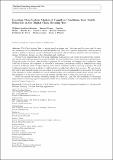Learning classification models of cognitive conditions from subtle behaviors in the digital Clock Drawing Test
Author(s)
Souillard-Mandar, William; Davis, Randall; Rudin, Cynthia; Au, Rhoda; Libon, David J.; Swenson, Rodney; Price, Catherine C.; Lamar, Melissa; Penney, Dana L.; ... Show more Show less
Download10994_2015_5529_ReferencePDF.pdf (2.324Mb)
OPEN_ACCESS_POLICY
Open Access Policy
Creative Commons Attribution-Noncommercial-Share Alike
Terms of use
Metadata
Show full item recordAbstract
The Clock Drawing Test—a simple pencil and paper test—has been used for more than 50 years as a screening tool to differentiate normal individuals from those with cognitive impairment, and has proven useful in helping to diagnose cognitive dysfunction associated with neurological disorders such as Alzheimer’s disease, Parkinson’s disease, and other dementias and conditions. We have been administering the test using a digitizing ballpoint pen that reports its position with considerable spatial and temporal precision, making available far more detailed data about the subject’s performance. Using pen stroke data from these drawings categorized by our software, we designed and computed a large collection of features, then explored the tradeoffs in performance and interpretability in classifiers built using a number of different subsets of these features and a variety of different machine learning techniques. We used traditional machine learning methods to build prediction models that achieve high accuracy. We operationalized widely used manual scoring systems so that we could use them as benchmarks for our models. We worked with clinicians to define guidelines for model interpretability, and constructed sparse linear models and rule lists designed to be as easy to use as scoring systems currently used by clinicians, but more accurate. While our models will require additional testing for validation, they offer the possibility of substantial improvement in detecting cognitive impairment earlier than currently possible, a development with considerable potential impact in practice.
Date issued
2015-10Department
Massachusetts Institute of Technology. Computer Science and Artificial Intelligence Laboratory; Massachusetts Institute of Technology. Department of Electrical Engineering and Computer Science; Sloan School of ManagementJournal
Machine Learning
Publisher
Springer US
Citation
Souillard-Mandar, William et al. “Learning Classification Models of Cognitive Conditions from Subtle Behaviors in the Digital Clock Drawing Test.” Machine Learning 102.3 (2016): 393–441.
Version: Author's final manuscript
ISSN
0885-6125
1573-0565